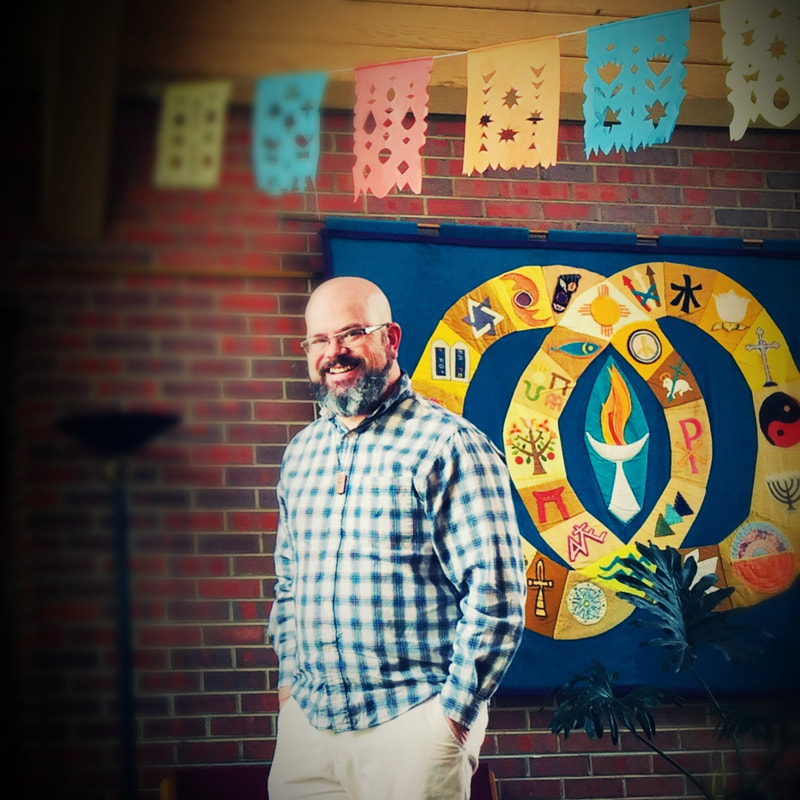|
Our theological theme for January is HOPE. As I was studying the subject in preparation, much of the discussion in Unitarian Universalist circles juxtaposes hope and optimism. For instance, here is a quote from one of my favorite Unitarian Universalist ministers, Victoria Safford: “Our mission is to plant ourselves at the gates of Hope- not the prudent gates of Optimism, which are somewhat narrower; nor the stalwart, boring gates of Common Sense; nor the strident gates of Self-Righteousness, which creak on shrill and angry hinges (people cannot hear us there; they cannot pass through); nor the cheerful, flimsy garden gate of "Everything Is Gonna Be All Right."
I debated in my mind (and with my husband, Pete, which is so fun!) about the difference between hope and optimism. I decided to look at the etymology of both words, and here is what I found: Hope: From the Old English hopian meaning "to wish, expect, look forward (to something)," of unknown origin. Some suggest a connection with hop (v.) on the notion of "leaping in expectation." Optimism: From French optimisme (1737); from Modern Latin optimum, used by Gottfried Leibniz (in "Théodicée," 1710) to mean "the greatest good"; from Latin optimus "the best." General sense of "belief that good ultimately will prevail in the world" first attested 1841 in Emerson; meaning "tendency to take a hopeful view of things" first recorded 1819 in Shelley. Since Ralph Waldo Emerson was a Unitarian, I found his definition of optimism particularly interesting - belief that good ultimately will prevail in the world. It reminds me of what his peer, Theodore Parker, said: “The arc of the moral universe is long, and it bends toward justice.” Their Universalist cousins were big on hope, too. John Murray, one of the founders of American Universalism said, “You may possess only a small light, but uncover it, let it shine, use it in order to bring more light and understanding to the hearts and minds of men and women. Give them not Hell, but hope and courage. Do not push them deeper into their theological despair, but preach the kindness and everlasting love of God.” After contrasting the two concepts of hope and optimism, I decided they are not that different. Maybe optimism is more specific about something good happening in the future. But do we really hope for, wish for, expect, or look forward to something bad happening? I don’t think so. So I gave up on comparing the two concepts and came to peace with the fact that both hope and optimism are a part of the Unitarian Universalist living tradition to this day. I have been wondering, however, about how we live with hope. I wonder if it can be a naive wish that takes us out of the present moment into the struggle of false expectations and disappointment. Does it lead us to focus on specific outcomes instead of encouraging us to stay focused on possibilities? Or does hope require we participate in creating those possibilities? If “hop” is part of its origin, then perhaps we should hop as we hope. Perhaps hope needs to be active. Eco-philosopher Joanna Macy PhD is a scholar of Buddhism, general systems theory, and deep ecology. I like what she writes: Active Hope is not wishful thinking. Active Hope is not waiting to be rescued by the Lone Ranger or by some savior. Active Hope is waking up to the beauty of life on whose behalf we can act. We belong to this world. The web of life is calling us forth at this time. We’ve come a long way and are here to play our part. With Active Hope we realize that there are adventures in store, strengths to discover, and comrades to link arms with. Active Hope is a readiness to engage. Active Hope is a readiness to discover strengths in ourselves and in others; a readiness to discover the reasons for hope and the occasions for love. A readiness to discover the size and strength of our hearts, our quickness of mind, our steadiness of purpose, our own authority, our love for life, the liveliness of our curiosity, the unsuspected deep well of patience and diligence, the keenness of our senses, and our capacity to lead. None of these can be discovered in an armchair or without risk. These are some of the concepts we’ll be exploring this month during worship and our Mindful Meetings. As with any theological topic, it’s easy to stay in our minds about the intellectual concepts and theories. While that can be fun, the real spiritual work is to practice living the concepts. So I invite you to experiment with hope this month. And as you do, observe what helps you. How do you experience hope? Is it a belief that something good will happen? Is it the confidence that something will make sense regardless of how it turns out? What are your sources of hope? In the face of so much of the world’s problems, what is the evidence for hope? What do you have hope in? What role does patience play in hope? Try writing a reflection on the ways you have been a bearer of hope to your family, friends, or community. Here are some resources for you and your family (thanks to folks at Foothills Unitarian for sharing these). Helpful Books and Articles for Adults Hope in the Dark, by Rebecca Solnit Active Hope, by Joanna Macy The Impossible Will Take a Little While, edited by Paul Loeb Turning to One Another, by Margaret Wheatley Mujerista Theology, by Ada Maria Isasi Diaz “From Hope to Hopelessness,” by Margaret Wheatley http://www.margaretwheatley.com/articles/fromhopetohopelessness.html Helpful Books & Articles for Children’s Engagement On That Day – A Book of Hope for Children by Andrea Patel http://www.amazon.com/On-That-Day-Children-Reading/dp/1582461007 Hope Is a Ferris Wheel by Robin Herera appropriate for older children grades 4-7 http://www.barnesandnoble.com/w/hope-is-a-ferris-wheel-robin-herrera/1116852561?ean=9781419710391 Article – PARENT Magazine Article – Raising a Hopeful Child – By Gershom Gorenberg http://www.parents.com/parenting/better-parenting/style/raising-a-hopeful-child/?page=1 Movies and Pop Culture Exploring Themes of Hope – Just a few! Love Actually - fabulous holiday movie, check it out if you haven’t seen it before, or watch it again, you know you love it The Shawshank Redemption – another classic, consider how it plays with themes of hope and hopelessness As always, I look forward to exploring this theme with you! Rev. Kelly 12/27/2016 02:09:38 am
Hope is something that we gain from believing. We hope because we believe. But along the way, we are to take actions. The blog post is really amazing and commendable. You defined hope precisely and accurately. I must say that hope is a word that has a lot of responsibility to take. Thank you for posting it. Comments are closed.
|
From the minister
|

